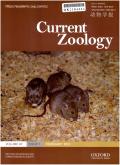Exploratory behavior is associated with the cognitive speed in male chestnut thrushes
IF 2
2区 生物学
Q2 ZOOLOGY
引用次数: 0
Abstract
Intra-individual variation in cognitive abilities has been widely reported in animals. Recent studies have found that individual cognitive performance varies with personality traits in a wide range of animal taxa, with a speed-accuracy trade-off between cognition and personality traits. Few studies investigated whether these relationships change depending on different contexts. Here we investigate whether the personality trait (as measured by exploratory behavior in a novel environment) is associated with cognition (novel skill learning and spatial memory) in wild male chestnut thrushes Turdus rubrocanus. Using an experimental novel skill learning task set-up, we found that fast-exploring individuals explored the experimental device (a cardboard with eight opaque cups) sooner than slow-exploring individuals. Exploratory behavior was not associated with individual spatial memory performances or an individual ’s capacity to learn the novel skill. Learning speed was positively associated with the difficulty of learning phases, and fast-exploring individuals used less trials to meet the learning criterion. In addition, fast-exploring individuals took less time to complete the 24-hour spatial memory test, but the accuracy of the test was not significantly different between individuals who were more or less exploratory. We suggest that variation in personality traits associates with individual learning speed in cognitive tasks, and that this relationship is context-dependent.雄性板栗鸫的探索行为与认知速度有关
动物认知能力的个体内变异已被广泛报道。最近的研究发现,在许多动物分类中,个体的认知表现随人格特征而变化,在认知和人格特征之间存在着一种速度-准确性的权衡。很少有研究调查这些关系是否会因不同的环境而改变。本文研究了野生雄性板栗鸫的人格特征(通过在新环境中的探索行为来衡量)是否与认知(新技能学习和空间记忆)相关。使用一种实验性的新技能学习任务设置,我们发现快速探索的人比缓慢探索的人更快地探索实验装置(一个装有八个不透明杯子的纸板)。探索性行为与个体空间记忆表现或个体学习新技能的能力无关。学习速度与学习阶段的难度呈正相关,快速探索个体使用较少的试验来满足学习标准。此外,快速探索性个体完成24小时空间记忆测试所需的时间更短,但测试的准确性在探索性强和探索性弱的个体之间没有显著差异。我们认为,人格特质的变化与个体在认知任务中的学习速度有关,而且这种关系是情境依赖的。
本文章由计算机程序翻译,如有差异,请以英文原文为准。
求助全文
约1分钟内获得全文
求助全文
来源期刊

Current Zoology
Agricultural and Biological Sciences-Animal Science and Zoology
CiteScore
3.20
自引率
9.10%
发文量
111
审稿时长
6 weeks
期刊介绍:
About the Journal
Current Zoology (formerly Acta Zoologica Sinica, founded in 1935) is an open access, bimonthly, peer-reviewed international journal of zoology. It publishes review articles and research papers in the fields of ecology, evolution and behaviour.
Current Zoology is sponsored by Institute of Zoology, Chinese Academy of Sciences, along with the China Zoological Society.
 求助内容:
求助内容: 应助结果提醒方式:
应助结果提醒方式:


